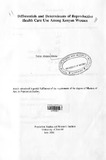| dc.description.abstract | The study was aimed at identifying socio-economic and demographic factors affecting
the utilization of reproductive health care among Kenyan mothers of reproductive
ages.
The data were drawn from the 1993 KDHS. Both cross tabulation and logistic
regression analysis were used as statistical tools.
The study found that the use of reproductive health care services and choices of
services varied according to a number of socio-economic and demographic factors.
The number of tetanus injections received for births varied strongly according to both
mother's and father's educational level, type of place of residence, father's
occupation, maternal age, children ever born , marital status and province of
residence. Similarly, the type of prenatal care received before birth varied according
to both mother's and father's educational level, father's occupation, children ever
born and province of residence. Furthermore, significant variations were found
between place of delivery and each dependent variable considered. Similarly,
significant variations were observed between source of prenatal care and each of the
dependent variables considered. For the source of delivery care, it was only earning
cash for work which did not cause significant variation.
The study found that among aiit.nths adoption of at least two TT injections was
significantly influenced by: the province of residence, children ever born and work
status of the mother. Similarly) the factors which affected receiving adequate prenatal
care among all the births were:- children ever born, mother s educational level,
maternal age, province of residence and marital status of the mother. Factors which
affected delivery at hospitals or clinics for the same births were: the province of
residence, children ever born, work status and marital status of the mother. Factors
which affected receiving prenatal care from doctors or nurses for all births were: the
province of residence, mother's educational level, children ever born, maternal age
and marital status of the mother. Factors which affected receiving delivery care from
doctors or nurses for all births were: the province of residence, mother's educational
level, type of place of residence, receiving prenatal care from doctors or nurses,
children ever born, marital status and work status of the mother.
The study also found that among births to married mothers, adoption of at least two
IT injections was significantly influenced by: the province of residence, children ever
born and father's educational level. Similarly, factors which affected receiving
adequate prenatal care for births to married mothers were: the province of residence,
mother's educational level, father's educational level, children ever born, maternal
age and marital status. Factors which affected delivering at hospitals or clinics for
births to married mothers were: the province of residence, mother's educational level,
type of place of residence, father's occupation and work status of the mother, father's
educational level and children ever born. Factors which affected receiving prenatal
care from doctors or nurses for births to married mothers were: the province of
residence, children ever born, mother'S educational eve. and maternal age. Factors
which affected receiving delivery care from doctors or nurses for births to married
mothers were: the province of residence, mother's educational level.type of place of
residence, receiving prenatal care from doctors or nurses, father's occupation, work
status of the mother, father's educational level and children ever born.
Recommendations for policy interventions and academic interest are given. For
example, it is recommended that for more births to be born in hospitals or clinics
such that more births be delivered at hospitals or clinics, programmes should focus
on those mothers who have no education and those who have primary level education
only, rural residents, those not working, those who have given birth to at least five
children, those who never married and those whose partner has never worked or has
worked in agriculture. Furthermore, the need for research to investigate why maternal
age has a positive effect on receiving adequate prenatal care is called for. | en |

